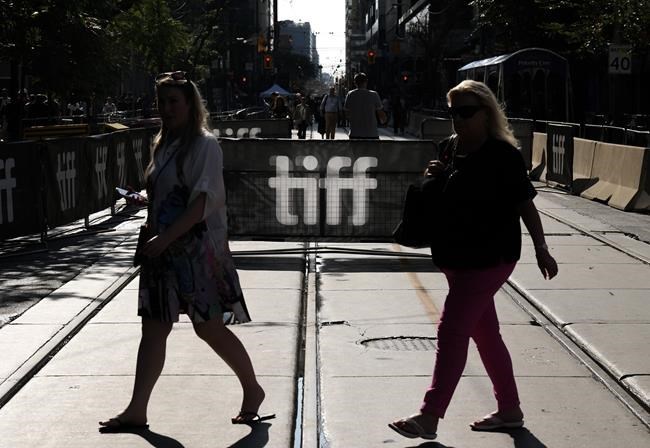TORONTO — In the halls of Parliament, TikTok is banned from civil servants' phones as the government grapples with allegations of foreign interference. But on Canada's red carpets and in sports arenas, the popular social media platform is still welcome.
The video-sharing app has served as the official voting platform for the Juno Awards' fan choice award, livestreamed the Osheaga music festival in Montreal and even emblazoned its logo across the helmets of Toronto Maple Leaf players for the last two seasons.
It's in the spotlight right now as a media partner of the Toronto International Film Festival. Last year, TikTok set up a recording booth along the event's main strip last year and had influencers host red carpets for the premieres of "Glass Onion: A Knives Out Mystery," "The Woman King" and "Bros."
But this year's iteration of TIFF will be unlike the last because Canada finds itself in a very different political climate, where TikTok is being treated with caution and in February was booted from federal devices. It’s also been the topic of an ongoing investigation from Canada's privacy commissioner and three provincial counterparts looking into whether the app complies with the country’s privacy legislation.
The moves stemmed from concerns that data the app owned by Beijing-based ByteDance collects on users could end up in the hands of the Chinese government, or that the platform could be used to push misinformation on users to influence the public in pro-China ways.
TikTok declined to comment for this story, but chief operating officer Vanessa Pappas has previously insisted China has never requested data from the company and it won’t comply if such an order is made.
Experts say the reasons for TikTok's Canadian partnerships in entertainment and sports are likely twofold: they offer a chance to placate worries by showing big brands are still comfortable being associated with the app, but also a means of boosting the app's userbase and coolness.
"It's a hearts and minds campaign," said Richard Lachman, a digital media professor at Toronto Metropolitan University (TMU).
TikTok has linked itself to brands integral to the Canadian identity like the Maple Leafs, he hypothesized, so that the tech company becomes entrenched in the country's culture.
The thinking, he said, may be this: "We're going to be at all the cultural events you think of so that we are regular, we are mainstream, we're not some something outside the normal. We are part of regular culture in Canada, for sure."
Fostering that link goes hand-in-hand with deflecting attention away from concerns.
"They're trying to say, 'Maybe don't pay attention to these other news stories you might be seeing,'" said Lachman.
In recent weeks, those stories include TikTok being kept off New York City's government-owned devices and a Montana ban on new downloads of the app triggered by FBI and U.S. Secretary of State Antony Blinken's concerns that China could access TikTok data. TikTok is challenging Montana's ban in court.
Brands don't appear to be put off by such headlines.
Asked about the political discourse around the app, the Canadian Academy of Recording Arts and Sciences, which hosts the Junos, said TikTok has been an “important partner” since 2021 and “engagement has been very strong.
“We hope to continue the partnership in the future.”
TIFF spokesperson Alejandra Sosa declined to comment.
The Leafs, which announced a TikTok partnership during the 2021-2022 season and extended it last season, did not respond to a request for comment. The team hasn't announced a partnership extension for this season.
Lachman suspects brands are drawn to TikTok partnerships because they help organizations drum up fans, attention and funding.
But the deals also have something equally lucrative for TikTok: access to wealthy crowds, including people who may control corporate advertising budgets.
"They're hoping to be in front of the business audience who attends regularly, who can afford the season ticket or the full festival pass," said Joanne McNeish, an associate professor at TMU specializing in marketing.
The celebrities, influencers, athletes and "young, more hip" audiences also make sponsorships attractive because they can draw in users that are sought after by advertisers, said Brett Caraway, a professor of media economics at the University of Toronto.
"Things like sports sponsorships, corporate events, concerts, any of that kind of stuff, festivals, are just another way for them to harvest more and more of those valuable users that they need on the platform to attract the people that they care the most about, which are actually advertisers," he said.
TikTok had about one billion global users in 2021, but a March 2023 report from TMU researcher Sam Andrey showed only 29 per cent of Canadians were on the platform.
However, those ranks are swelling. TikTok experienced the fastest rate of growth among top social media apps used by Canadians, nearly tripling its reach from 10 per cent in 2019.
Yet trust in TikTok was particularly low among respondents to Andrey's survey, falling so far that the app replaced Facebook as Canada’s least trusted social media organization.
About 50 per cent of respondents had low trust in TikTok, up from 36 per cent in 2021, while only seven per cent had high trust in the app, down from 16 per cent over the same period.
Despite declining trust, Lachman said many users don't appear to be concerned with TikTok or its brand partnerships.
"It does not seem like there's massive public outcry saying, 'We don't like this brand, we don't like this content. We're worried about Chinese or foreign interference, so we don't want your organization to be affiliated (with TikTok),'" he said.
"I've not seen that level of backlash."
This report by The Canadian Press was first published Sept. 11, 2023.
Tara Deschamps, The Canadian Press

